Edie Melson's Blog, page 207
March 8, 2020
Storytelling for Authors, Part 1
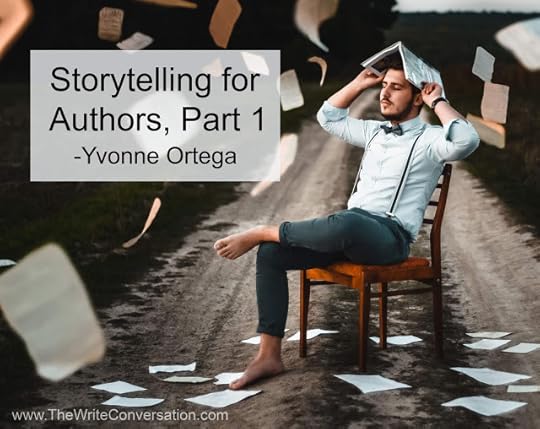
by Yvonne Ortega @YvonneOrtega1
Have you ever spoken to a group to promote your business or ministry and wished you hadn’t?
A little over twenty years ago, I spoke for a conference and hoped it would launch my career. It didn’t. I rambled on and on. I had the passion to speak, but no storytelling techniques.Fast forward to today. I spoke for a breast cancer event. I held their attention from start to finish, motivated the audience to move from broken to beautiful through cancer, and received a standing ovation. When I spoke at a women’s brunch. I hooked the audience from the first sentence, interacted with them, and presented a clear message.
What made the difference?
I learned the 9 Cs of Storytelling for Speakers.
You, too, can learn the 9 Cs of Storytelling and apply them to your next presentation. You will feel more confident when you can capture your audience’s attention, interact with them, and present a clear message.
The first C of Storytelling is Curiosity. A question will stir up the curiosity of your audience. In my story, “Moving from Broken to Beautiful through Grief,” I asked, “Have you ever been hurt by someone you trusted, loved, and respected? Did you struggle with anger?”
To hook the audience, you can start with the words, “Have you ever . . .?” Take time to write an opening question for your next presentation.
Now pick a partner from your critique or writing group. Call or email the person, share your opening question, and get feedback. Be open to suggestions. Let’s look at the second C, Circumstance. To have a message, you need a mess with age. Go through the details of your mess and get to the circumstance. In my story, “Moving from Broken to Beautiful through Grief,” I said, “I stood in the kitchen on a long-distance call with my ex-husband about our son, Brian’s death. He said, ‘I’m planning his service and burial.’ I tightened my grip on the cold kitchen counter.”
Think of your circumstance. What was the mess? Include at least one or two of the four senses in your story. Three of the four would be great. Craig Valentine, an International speaking coach and master storyteller, calls the senses “the V.A.K.S:” visual, auditory, kinesthetic, and smell. He doesn’t say, “Olfactory,” because V.A.K.S. sounds better than V.A.K.O.
Be able to present your circumstance in less than twenty seconds. Remember that telling shorter stories makes you more likable, memorable, and repeatable. Write your circumstance and include at least one or two of the V.A.K.S.
Again, call or email a critique partner or writing group member and share your circumstance for feedback. If you can meet in person, that could help both of you.
The third C.Now that you’ve stirred up curiosity and set the circumstance of your story, let’s move on to the third C, Characters. To keep your story simple, have only two or three characters.
Pick the most emotional and visual characteristics of your characters. My story has two characters: me and my ex-husband. Have you ever talked with someone who made you feel unwanted, unloved, and worthless? Meet Mr. Not Nice, my ex-husband.
Since I didn’t want to use his name, I used an adjective name. You can do that, too. One or two emotional descriptive words will help your audience see the character.
Describe your characters. Perhaps you can pick a partner and meet in person to allow both of you to work on your storytelling techniques, encourage, and support each other.
To wrap up, the Cs of Storytelling for Authors that we covered are:Curiosity-Use a question to stir up the curiosity of your audience.Circumstance-Use a mess with age.Characters-Keep your story simple with only two or three characters.TWEETABLEStorytelling for Authors, Part 1 - @YvonneOrtega1 on @EdieMelson (Click to Tweet)
 Yvonne Ortega walks with a small footprint but leaves a giant imprint in people’s lives. This power-packed package is a professional speaker and the author of the Moving from Broken to Beautiful® Series through cancer, divorce, forgiveness, and loss. Learn more at www.YvonneOrtega.com
Yvonne Ortega walks with a small footprint but leaves a giant imprint in people’s lives. This power-packed package is a professional speaker and the author of the Moving from Broken to Beautiful® Series through cancer, divorce, forgiveness, and loss. Learn more at www.YvonneOrtega.comYvonne speaks with honesty and humor as she shares her life and struggles through presentations that empower women to find peace, power, and purpose through God’s Word.
Yvonne’s background as a licensed professional counselor brings a unique perspective into the heart of women. She’s a speaking and writing coach and the owner of Moving from Broken to Beautiful®, LLC. She belongs to the Advanced Writers and Speakers Association, the Christian Authors Network, the National Speakers Association, and Toastmasters International.
She celebrates life at the beach, where she walks, builds sand castles, blows bubbles, and dances.
Published on March 08, 2020 22:00
March 7, 2020
When the Unimportant Becomes Too Important
Edie here. Today I'm super excited to introduce you to our newest Write Conversation Columnist - Martin Wiles. I've long admired his writing and the way his dedication to the Lord always shines through everything he does. Now I've managed to persuade him to share his heart with us every month. Be sure to give Martin a warm TWC welcome!
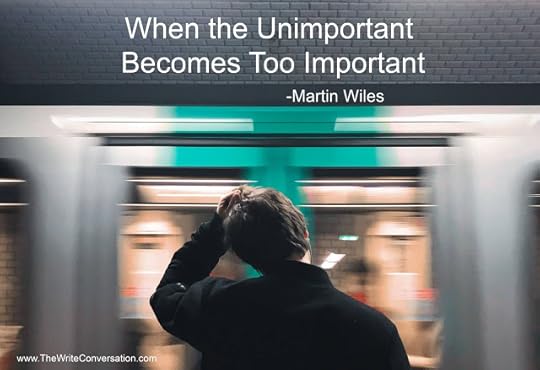
When the Unimportant Becomes Too Importantby Martin Wiles @LinesFromGod
But all too quickly the message is crowded out by the worries of this life, the lure of wealth, and the desire for other things, so no fruit is produced. (Mark 4:19 NLT)
Sometimes, the unimportant becomes too important. Marcin Muchalski was taking a morning stroll along the Williamsburg Bridge when a mugger surprised him, took out a gun, and requested his cell phone. Thinking the robber would not shoot him in the middle of the Williamsburg Bridge at seven in the morning, Muchalski dared the robber to pry the gun off his cold, dead hands. The robber obliged by shooting Muchalski in the leg. Instead of handing over the phone, Muchalski limped away as fast as he could with phone in hand. The robber, who had more sense that Muchalski, decided not to chase the man. The phone wasn’t worth a murder charge.
Or take Marie Murphy, a New Jersey teacher who got a call saying her house was on fire. She rushed home, not fearing anyone was in danger. She knew her husband—and her mother who had been staying with them—was not in the blazing house. But what drove Murphy to run into a blazing house and risk her life? Baseball tickets. More specifically, her season tickets to see the Phillies.
She ignored all her other possessions—even the certificate of fire insurance—all to save her tickets. Luckily, she made it out before everything else—the house included—went up in flames. Although she and her husband had to live in a motel for a while after the fire, they were able to settle with the insurance company. Murphy was also surprised at school one day when a Phillies fanatic tossed a bunch of Phillies merchandise to her, including a framed World Series ticket. Perhaps around this time, she thought about how foolish her actions had been, especially when she learned the Phillies would have reprinted her tickets because they burned in a fire.
And then there’s Guita Sazan Silverstein. She decided to leave her two-year-old son in her car on a hot summer day while she did some shopping. When she returned to her car, she discovered she had locked herself out. With temperatures in the upper 80’s, her child was at risk of heat stroke. She called for help. When the firefighters arrived, they told her they would need to break one of her car windows. Silverstein told them no. After all, the car was an Audi.
Silverstein came up with a compromise. She would drive more than a mile to her home and retrieve her spare set of keys—even though her son had already been in the car for twenty minutes. After borrowing a car to drive home, firefighters broke the window anyway and rescued the child—who by this time was unresponsive, but luckily revivable. When the mother returned, she was arrested for reckless endangerment and risk of injury to a minor. (7 Most Ridiculous Cases of Misplaced Priorities)
I’ve never made the same mistakes as Marcin, Marie, or Guita, but I have made more than my share of other poor choices. And I have let the not-so-important become important more than I care to mention.
Jesus tells a story of a farmer scattering seed. The seed fell on various types of soil, some on soil infested with thorns. As the seed sprouted and grew, the thorns choked out the plants. According to Jesus, this represents those who let the worries the life, the deceitfulness of wealth, and the desire for things distract them. Those who hold too tightly to a cell phone. Those who rush into a burning home for sporting tickets. Or those who let a shopping excursion put a child in danger.
A regular diet of God’s Word reminds me of what the thorns of unimportance are—and how they can lead me into fields I would do well to avoid. Prayer for strength I don’t have helps me distinguish between the unimportant and the important so I can walk in fertile fields. Fields where the seeds of love, joy, peace, patience, kindness, goodness, faithfulness, gentleness, and self-control will sprout, grow, and produce fruit for God’s glory.
Don’t let the unimportant rob you of the blessings of choosing the important.
TWEETABLEWhen the Unimportant Becomes Too Important - @LinesFromGod on @EdieMelson (Click to Tweet)
 Martin Wiles is the founder of Love Lines from God (www.lovelinesfromgod.com) and serves as Managing Editor for Christian Devotions, Senior Editor for Inspire a Fire, and Proof Editor for Courier Publishing. He has authored six books and has been published in numerous publications. His most recent book, A Whisper in the Woods: Quiet Escapes in a Busy World, released in December 2019. He is a freelance editor, English teacher, author, and pastor.
Martin Wiles is the founder of Love Lines from God (www.lovelinesfromgod.com) and serves as Managing Editor for Christian Devotions, Senior Editor for Inspire a Fire, and Proof Editor for Courier Publishing. He has authored six books and has been published in numerous publications. His most recent book, A Whisper in the Woods: Quiet Escapes in a Busy World, released in December 2019. He is a freelance editor, English teacher, author, and pastor.

When the Unimportant Becomes Too Importantby Martin Wiles @LinesFromGod
But all too quickly the message is crowded out by the worries of this life, the lure of wealth, and the desire for other things, so no fruit is produced. (Mark 4:19 NLT)
Sometimes, the unimportant becomes too important. Marcin Muchalski was taking a morning stroll along the Williamsburg Bridge when a mugger surprised him, took out a gun, and requested his cell phone. Thinking the robber would not shoot him in the middle of the Williamsburg Bridge at seven in the morning, Muchalski dared the robber to pry the gun off his cold, dead hands. The robber obliged by shooting Muchalski in the leg. Instead of handing over the phone, Muchalski limped away as fast as he could with phone in hand. The robber, who had more sense that Muchalski, decided not to chase the man. The phone wasn’t worth a murder charge.
Or take Marie Murphy, a New Jersey teacher who got a call saying her house was on fire. She rushed home, not fearing anyone was in danger. She knew her husband—and her mother who had been staying with them—was not in the blazing house. But what drove Murphy to run into a blazing house and risk her life? Baseball tickets. More specifically, her season tickets to see the Phillies.
She ignored all her other possessions—even the certificate of fire insurance—all to save her tickets. Luckily, she made it out before everything else—the house included—went up in flames. Although she and her husband had to live in a motel for a while after the fire, they were able to settle with the insurance company. Murphy was also surprised at school one day when a Phillies fanatic tossed a bunch of Phillies merchandise to her, including a framed World Series ticket. Perhaps around this time, she thought about how foolish her actions had been, especially when she learned the Phillies would have reprinted her tickets because they burned in a fire.
And then there’s Guita Sazan Silverstein. She decided to leave her two-year-old son in her car on a hot summer day while she did some shopping. When she returned to her car, she discovered she had locked herself out. With temperatures in the upper 80’s, her child was at risk of heat stroke. She called for help. When the firefighters arrived, they told her they would need to break one of her car windows. Silverstein told them no. After all, the car was an Audi.
Silverstein came up with a compromise. She would drive more than a mile to her home and retrieve her spare set of keys—even though her son had already been in the car for twenty minutes. After borrowing a car to drive home, firefighters broke the window anyway and rescued the child—who by this time was unresponsive, but luckily revivable. When the mother returned, she was arrested for reckless endangerment and risk of injury to a minor. (7 Most Ridiculous Cases of Misplaced Priorities)
I’ve never made the same mistakes as Marcin, Marie, or Guita, but I have made more than my share of other poor choices. And I have let the not-so-important become important more than I care to mention.
Jesus tells a story of a farmer scattering seed. The seed fell on various types of soil, some on soil infested with thorns. As the seed sprouted and grew, the thorns choked out the plants. According to Jesus, this represents those who let the worries the life, the deceitfulness of wealth, and the desire for things distract them. Those who hold too tightly to a cell phone. Those who rush into a burning home for sporting tickets. Or those who let a shopping excursion put a child in danger.
A regular diet of God’s Word reminds me of what the thorns of unimportance are—and how they can lead me into fields I would do well to avoid. Prayer for strength I don’t have helps me distinguish between the unimportant and the important so I can walk in fertile fields. Fields where the seeds of love, joy, peace, patience, kindness, goodness, faithfulness, gentleness, and self-control will sprout, grow, and produce fruit for God’s glory.
Don’t let the unimportant rob you of the blessings of choosing the important.
TWEETABLEWhen the Unimportant Becomes Too Important - @LinesFromGod on @EdieMelson (Click to Tweet)
 Martin Wiles is the founder of Love Lines from God (www.lovelinesfromgod.com) and serves as Managing Editor for Christian Devotions, Senior Editor for Inspire a Fire, and Proof Editor for Courier Publishing. He has authored six books and has been published in numerous publications. His most recent book, A Whisper in the Woods: Quiet Escapes in a Busy World, released in December 2019. He is a freelance editor, English teacher, author, and pastor.
Martin Wiles is the founder of Love Lines from God (www.lovelinesfromgod.com) and serves as Managing Editor for Christian Devotions, Senior Editor for Inspire a Fire, and Proof Editor for Courier Publishing. He has authored six books and has been published in numerous publications. His most recent book, A Whisper in the Woods: Quiet Escapes in a Busy World, released in December 2019. He is a freelance editor, English teacher, author, and pastor.
Published on March 07, 2020 22:00
March 6, 2020
The Angst of Writing Contests
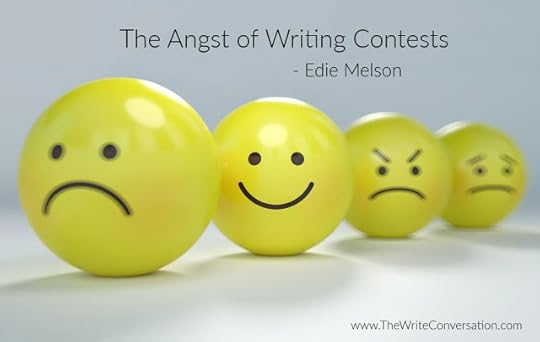
by Edie Melson @EdieMelson
We’ve just announced the finalists in the Selah award contest in conjunction with the Blue Ridge Mountains Christian Writers Conference, so writing contests are on my mind. Over the past 24-hours I’ve done everything from congratulate to commiserate with writers who entered, and it’s made me consider how I view contests—and how I should view contests.It’s easy for me to be unbiased when it comes to this particular contest because I’m not allowed to enter it. My co-director, DiAnn Mills and I, along with contest director, Eva Marie Everson, set the contest up that way on purpose to protect the integrity of the judging.
Before you jump to any conclusions, NO we don’t have anything to do with the judging for this contest. We really don’t have much to do with it at all. We leave that up to the amazing Eva Marie Everson. She does an amazing job, including protecting this contest with the ferociousness of a she-wolf defending her young. And to be clear, she doesn’t do any of the judging either. She pulls in readers to give their honest opinions about the books entered. We don’t allow editors or agents or anyone else with connections to specific parts of the industry take part in the judging.
But readers are fickle—and opinionated. What one likes, another dislikes. And that is what’s at the heart of this post. Entering a writing contest isn’t like solving a math problem for the right answer, it’s subjective and unpredictable.
Enter the AngstFact 1: Good books don’t always win. Sometimes they don’t even make the finalist list.
Fact 2: What we may consider as “poor books” sometimes win and make the finalist list.
Conclusion: Writing contests aren’t FAIR.
Now the TruthWriting contests aren’t fair. Yep I said it—and I’ll go one step further. Very little about the publishing world is fair. It’s a subjective industry full of unpredictable people. But just because a contest isn’t fair, doesn’t mean it doesn’t have value.
Let’s look at the concept of fairness. It’s something we learned about in Kindergarten and while it had purpose there, it pretty much skewed our perception of how things should be.
Truthfully, life isn’t fair.
So why enter a contest if it’s not going to give us a fair shot? But that’s another misconception. Contests really do give authors a pretty fair shot. We do everything we can to limit the biases and equal the playing field. But we’re part of a subjective industry, so the end results don’t always appear fair.
To find the value in entering contests, we must look beyond just winning and losing.
Onto the ValueValue #1: Experience submitting your work without knowing the outcome. It’s good practice for submitting our work for publication.
Value #2: Visibility. Even if we don’t win, there are judges who see our work. Many contracts have come from a judge seeing a writer’s work—whether it won or not.
Value #3: The possibility of winning.
Acknowledging the EmotionsEntering a writing contest does engage our emotions, no matter how much we try to keep it from happening. There’s nothing wrong with getting excited when we win, or sad when we don’t. The important thing is to keep our perspective. Winning or not winning a contest won’t make or break us. Publishing is a journey. It has highs and lows, as well as easy times and difficult ones.
Publishing is also a career and/or ministry choice for many of us. When that’s the case, we need to remain professional in all our dealings. Calling out a contest and labeling it as unfair won’t change the system, but it will make us look petty and unprofessional. Rubbing a win in the faces of others has the same negative impact on our publishing goals.
Bottom LineGo ahead a take a chance and enter the contests that appeal to you. Increase the odds by following the directions exactly and make sure the contest you’re entering is a good fit for the writing you’ve done. Then sit back and enjoy the ride. Sometimes you win, sometimes you don’t, but good will come out of the experience, no matter what.
These are my thoughts on entering contests. I’d love to know yours. Be sure to leave a comment in the section below.
And don’t forget to join the conversation!Blessings, Edie
TWEETABLEExploring the Angst of Writing Contests - @EdieMelson (Click to Tweet)
 Edie Melson is a woman of faith with ink-stained fingers observing life through the lens of her camera. No matter whether she’s talking to writers, entrepreneurs, or readers, her first advice is always “Find your voice, live your story.” As an author, blogger, and speaker she’s encouraged and challenged audiences across the country and around the world. Her numerous books reflect her passion to help others develop the strength of their God-given gifts and apply them to their lives. Connect with her on her website, through Facebook, Twitter and Instagram.
Edie Melson is a woman of faith with ink-stained fingers observing life through the lens of her camera. No matter whether she’s talking to writers, entrepreneurs, or readers, her first advice is always “Find your voice, live your story.” As an author, blogger, and speaker she’s encouraged and challenged audiences across the country and around the world. Her numerous books reflect her passion to help others develop the strength of their God-given gifts and apply them to their lives. Connect with her on her website, through Facebook, Twitter and Instagram.
Published on March 06, 2020 22:00
March 5, 2020
The ABCs of Blogging
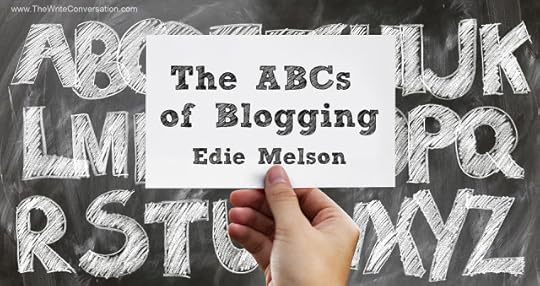
by Edie Melson @EdieMelson
Today I’d like to give you 26 tips for success with your blog. I’m calling this my ABCs of Blogging.
B is for Basics—Whatever you’re doing, make it excellent. That means take time to check for typos and readability, in your posts. Also be sure you’re using giving accurate links. There’s nothing more frustrating than clicking on a link that takes you nowhere.
C is for Connections—Think of your blog as a place where your audience can drop by and have a metaphorical cup of coffee with you. It’s a place for you to connect with on a deeper level. Answer comments and join the conversation. Blogging is not a synonym for lecturing.
D is for Discipline—When you begin a blog, you make a commitment to your audience. You want them to show up regularly and they expect the same for you. They won’t expect perfection—after all life happens to all of us—but they will expect discipline from you.
E is for Energy—Make sure your posts are full of energy. Use active verbs, vibrant descriptions and always end with a call to action. The action could be as simple as joining the conversation or as challenging as changing the world.
F is for Focus—You cannot be everything to everybody. Pick a focus for your site, but don’t be afraid to refine it based on what you hear from your audience.
G is for Google—Do your homework and know what it takes to rank high in the search engines. This means you need to know about SEO (Search Engine Optimization), as well as how to label and tag your blog correctly. And always remember it isn’t content that’s king, it’s GOOD content that rules.
H is for Hearing—Pay close attention to the comments your audience leaves. You’ll find great ideas for future blogs, as well as find out what your audience is interested in. Also keep tabs on your analytics. Knowing which posts are your most popular will go a long way to helping you determine the focus for you blog.
I is for Image—There’s a reason behind the saying, “A picture is worth a thousand words.” Use images to illustrate every post and to break up the text so it’s easier to read.
J is for Jump Break—This little tool can help your blog load faster and your email notifications run smoother. Not sure what I’m talking about? Here’s a post I wrote that give you everything you need to know about jump breaks.
K is for Keeping On—Building an audience for your blog takes time . . . and diligence. Don’t give up too soon. Here’s what to reasonably expect for blog growth.
L is for Links— Social Media Links, that is. If someone takes time to visit your blog, make sure they can connect with you on social media as well. Have all your social media links in an easy to see place on your blog header or sidebar.
M is for Mobile—Make sure your blog is easy to read on a mobile device and/or tablet. This isn’t just about how it looks, but also the length of posts, size of the text, etc.
N is for Numbers—Remember your worth—and your blog’s worth— is NOT determined by the number of people who visit.
P is for Passion—You may be able to write about something you’re not passionate about for a month or two. But after that, I guarantee you’ll be miserable. So pick something you’re passionate about as a focus for your site.
Q is for Question—Always end your post with a question (or at least a call to action) to help get the conversation started.
R is for Reputation—In this business (publishing and blogging) reputation is everything. Develop a reputation for excellence and you’ll never lack for work—or for an audience!
S is for Subscribers—Make sure you have a way for people to subscribe to your blog through email and through RSS.
T is for Titles—Don’t neglect the titles you choose for your blog posts. Social media is a no man’s land without context. A good rule is to look at your title and ask if someone would know what your post was about just by reading the title.
U is for Understand—Take time to understand the culture of the online universe. This includes etiquette, as well as expectations.
V is for Value—Give your audience something of value every single time you post. No one has time to waste and your audience is no exception.
W is for Weight—Don’t overload any part of your blog. Keep your sidebars trim and uncluttered. Don’t have too many links within a blog post. The ideal is no more than two to three per 500 words. If you encourage people to click away more than a couple of times, statistics prove they won’t come back. But most of all, don’t weigh down your posts with unnecessary words. Wordiness is never a good thing for a writer, but it’s absolute death to a blogger.
X is for Examine—I try to evaluate my blog two to three times a year. I take a look at my most popular posts, as well as the ones that garnered the most comments. I also try to look at it like a first-time visitor would. Is it easy to navigate? Do the page tab titles make sense? Are my social media links all working correctly.
Y is for Yellow—Not as in cowardly, but the color yellow. Avoid it when you blog. It’s the most unpopular color for use on a blog. It’s also the hardest to see and has the largest variation over devices.
Z is for Zoom In—When you pick a topic for a blog post, zoom in. Don’t try to cover too much at once. Stay laser-focused. Beyond that, zoom in on your word count. Blog posts are almost always shorter than print articles. It’s the nature of the medium.
These are my top tips. I’d love to hear some of yours! Leave your thoughts in the comments section below.
Don’t forget to join the conversation!Blessings,
Edie
TWEETABLEThe ABCs of Blogging - @EdieMelson (Click to Tweet)
 Edie Melson is a woman of faith with ink-stained fingers observing life through the lens of her camera. No matter whether she’s talking to writers, entrepreneurs, or readers, her first advice is always “Find your voice, live your story.” As an author, blogger, and speaker she’s encouraged and challenged audiences across the country and around the world. Her numerous books reflect her passion to help others develop the strength of their God-given gifts and apply them to their lives. Connect with her on her website, through Facebook, Twitter and Instagram.
Edie Melson is a woman of faith with ink-stained fingers observing life through the lens of her camera. No matter whether she’s talking to writers, entrepreneurs, or readers, her first advice is always “Find your voice, live your story.” As an author, blogger, and speaker she’s encouraged and challenged audiences across the country and around the world. Her numerous books reflect her passion to help others develop the strength of their God-given gifts and apply them to their lives. Connect with her on her website, through Facebook, Twitter and Instagram.
Published on March 05, 2020 22:00
March 4, 2020
When a Writer Needs to Rediscover Her Reading Mojo

by Lynn H. Blackburn @LynnHBlackburn
While some writers have been writing stories since they could hold a pencil, that wasn’t my experience. I was a reader first. For thirty-five years I fell into books, crawled into stories, and lived there as often as possible.
Then one day the stories in my head tumbled onto a page. I started writing, and for a while the writing seriously messed up my reading life! Perhaps you can relate?I found myself analyzing everything I read. It was almost impossible to lose myself in a story the way I used to. I wondered if the author was a plotter or a pantser, how they did their research, or why they went in a certain direction with a story. I couldn’t stop myself from studying the story to see where the plot points were and how the elements of the story matched the expectations set forth for that particular genre.
It was exhausting.
Reading had been my escape, books my best friends. But now they felt like work. The magic of them had faded because I had peeked behind the curtain. I knew how much work went into each page and because I knew so much more about what good writing sounded like, I found myself editing the words and rewriting sentences in my mind as I read.
As much I loved writing my own stories, I wondered if I would ever love reading again the way I used to.
If you’ve experienced something similar, let me give you some hope.
Over the last few years, I’ve rediscovered my love of reading. I still don’t have as much time to read as I would like, but I’ve found a few tricks that help me dive back into the stories that help feed my imagination and my soul.
1. Choose wisely. If you’re struggling to enjoy your reading or if you’ve fallen out of the habit of reading, choose a book in a genre you know and love, by an author you know and love. And don’t be afraid to reread a favorite. This is not the time to choose a 700-page doorstopper. Go for something short and something fun. You can tackle the epics and classics after you’ve reestablished your reading mojo.
2. Give each book a chance, and don’t be surprised if it takes a little longer for a story to suck you in than it used to. Before I started writing, it wasn’t unusual for a book to capture my imagination within the first couple of paragraphs. That’s rare these days. Sadly, it still takes me a while to get my internal editor to shut up, but I’ve found that if I’m willing to stick with a book, that pesky editor usually slinks off and allows me to enjoy the story in peace.
3. Just because you start a book, that doesn’t mean you have to finish it. Life’s too short to read crummy books. If my internal editor won’t give up after a few chapters, I’m likely to set that book to the side. There are tons of well-written and binge-worthy books waiting for you to enjoy. Read them.
4. Read widely. Read what you write, but don’t neglect other options. Read poetry, romance, thrillers, sci-fi, historical. Choose fiction and nonfiction. Seek out stories written by people of all races, by men and women, and by young and old authors alike. And don’t forget about children’s, middle grade, and YA stories.
5. Read a different way. Try an audio book, and yes, that does count as reading. If you prefer long novels, choose a short story or novella collection. If you’re a fan of paper (and believe me, I understand), try digital. If you usually go digital, grab a hardcover. Sometimes a little jolt is what we need to get us out of a rut.
6. Be amazed and appreciative. Before I started writing, if I found a book that glued me to my chair and kept me turning pages long after bedtime, I usually thought, “Wow, that story was fabulous.” These days? I’m more like to say something like, “That author is amazing.” And then I try to share the love. I may post it on social media, tell my friends, or encourage others to read the story. Don’t ever hesitate to reach out to an author and tell him or her how much you enjoyed their book. Everyone needs encouragement!
7. Don’t quit. Keep trying until you find a book that reminds you why books are so awesome. And then find another. You’ll be so glad you did and ultimately your writing will be better for it!
I’d love to hear about your experiences with reading as a writer. Don’t forget to join the conversation!
Grace and peace,

TWEETABLEWhen a Writer Needs to Rediscover Her Reading Mojo - @LynnHBlackburn on @EdieMelson (Click to Tweet)
 Lynn H. Blackburn loves writing suspense because her childhood fantasy was to become a spy—but her grown-up reality is that she's a huge chicken and would have been caught on her first mission. She prefers to live vicariously through her characters and loves putting them into all kinds of terrifying situations—while she's sitting at home safe and sound in her pajamas!
Lynn H. Blackburn loves writing suspense because her childhood fantasy was to become a spy—but her grown-up reality is that she's a huge chicken and would have been caught on her first mission. She prefers to live vicariously through her characters and loves putting them into all kinds of terrifying situations—while she's sitting at home safe and sound in her pajamas! Her Dive Team Investigations series kicked off in 2018 with Beneath the Surface and In Too Deep (A SIBA Okra pick and Selah Award Finalist). The 3rd book in the series, One Final Breath, releases in September 2019. She is also the author of Hidden Legacyand Covert Justice,which won the 2016 Carol Award for Short Novel and the 2016 Selah Award for Mystery and Suspense. Lynn lives in South Carolina with her true love and their three children. You can follow her real life happily ever after at www.LynnHBlackburn.com and on Facebook, Twitter, Pinterest, and Instagram.
Published on March 04, 2020 22:00
March 3, 2020
Learn to Build Tension in Your Novel
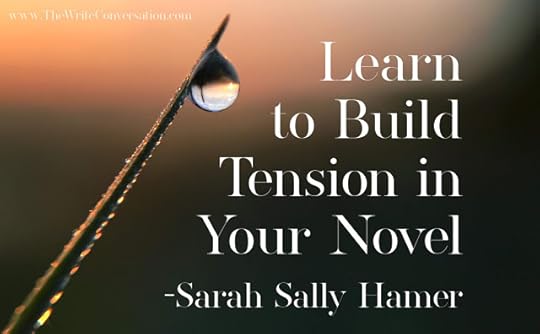
by Sarah Sally Hamer @SarahSallyHamer
Conflict and tension are very different. Conflict is a problem between two ‘things’—two people, two armies, two countries, a person and a fish—or even an argument between two points of view in a person’s head. Tension, on the other hand, raises questions in our stories and is there all the time. We need both.Every story is a mystery/suspense story—at least to some degree or another. Think about it. The reader has to wait to uncover whatever it is the writer wants to tell. We may have a good idea of what’s going to happen but, ultimately, the reader won’t read the story if we don’t worry about how it’s going to work out.
So, the author’s ‘job’ is to continually create places in the story where the reader becomes anxious to see what’s going to happen next. Readers want to wonder and be surprised—and shocked—and to demand to see more. If you’re of ‘a certain age’ you might remember the serials movie theaters used on Saturday mornings. They’d have ‘Cowboy Bob’ or ‘Dick Tracy’ in a short segment where the audience is left hanging at the end, panting for more. In fact, Arthur Conan Doyle wrote several of the Sherlock Holmes mysteries in serial form in a magazine published in the U.K. back in the 1880’s and ‘90’s. His audience was so involved with the stories that they stood in line waiting for the release of the next issue. That’s not conflict it’s the building of expectations. Tension. Tension is absolutely necessaryTension comes from both inside and outside your protagonist:Internal: what drives him or herExternal: what happens to him or herThere are also two basic levels of tension:Global: as in the actual set-up of your storyScene by scene: as in what happens in each scene Tension is not about car wrecks and sword fights. It’s about things that happen to your characters and how they react to them. Tension is not boring!
That being said, it doesn’t mean that you have something crazy going on every minute. Tension is a rising and falling proposition – you want it to ebb and flow. Think about a siren. If it’s always at exactly the same pitch and the same volume, you’d eventually tune it out. But instead, a police siren rises and falls, which brings more attention to it.
Same with tension in a story.
Conflict and tension usually walk hand in hand and need to be set up together. Conflict is usually situational and tension is usually how conflict plays out.
An example?
Joe goes to the store to buy milk for the baby.
He walks to the refrigerated section of the store, opens the glass door, picks up a carton of whole milk and strolls back to the register.
He pulls his wallet from his pocket, pays the lady and goes home.
The baby stops crying and everybody is happy.
Interesting? I think not!
Let’s put some real problems in.
Joe’s wife meets him at the door.
They’re out of milk.
He can hear the baby crying frantically in the background. He knows she has to eat but he didn’t find work today. And, when he panhandled a guy on the sidewalk, the man called the police from his cell phone.
Joe looks over his shoulder, wondering if the cops will follow him home.
He HAS to get milk but his pockets are empty. And he’s hungry too.
He makes a choice, one he’s contemplated more than once – to rob the convenience store on the corner.
He pushes past his wife and goes to the dresser drawer where his father’s gun is stored.
He sits on the side of the bed for a minute, turning the gun over and over in his hands, his wife begging him not to go.
He stands up and walks out of the house.
The conflict is in the setup. The tension will be in how he handles it.
This isn’t a fully-fleshed out story in any sense of the word but it has lots of tension. It also doesn’t tell us what happens next but look at all the questions it raises: Will he rob the store? Will he get away with it? Will he get caught by the police before he can get to the store? Will he…
Whatever he chooses—one of these or one of a dozen, even better ones—will set up the next episode of conflict. And that one will set up the next one. Until, finally, a big explosive confrontation between your protagonist and his nemesis—whether internal or external—leads us to a satisfying ending.
Tension. Conflict. Problems.
Interesting!
How do you raise the stakes in your story? Do you have plenty of tension?
TWEETABLELearn to Build Tension in Your Novel - @SarahSallyHamer on @EdieMelson (Click to Tweet)
 Sarah (Sally) Hamer is a lover of books, a teacher of writers, and a believer in a good story. Most of all, she is eternally fascinated by people and how they 'tick'. She’s passionate about helping people tell their own stories, whether through fiction or through memoir. Writing in many genres - mystery, science fiction, fantasy, romance, medieval history, non-fiction – she has won awards at both local and national levels, including two Golden Heart finals.
Sarah (Sally) Hamer is a lover of books, a teacher of writers, and a believer in a good story. Most of all, she is eternally fascinated by people and how they 'tick'. She’s passionate about helping people tell their own stories, whether through fiction or through memoir. Writing in many genres - mystery, science fiction, fantasy, romance, medieval history, non-fiction – she has won awards at both local and national levels, including two Golden Heart finals.A teacher of memoir, beginning and advanced creative fiction writing, and screenwriting at Louisiana State University in Shreveport for almost twenty years, she also teaches online for Margie Lawson at www.margielawson.com. Sally is a free-lance editor and book coach at Touch Not the Cat Books, with many of her students and clients becoming successful, award-winning authors.
You can find her at hamerse@bellsouth.net or www.sallyhamer.blogspot.com
I wish to express gratitude to the giants whose shoulders I stand on and who taught me so much about the writing craft. I would list every one, if it were only possible.
Published on March 03, 2020 22:00
March 2, 2020
Write Anyway

by PeggySue Wells @PeggySueWells
Daughter of a town marshal, and recipient of the Nora Roberts Lifetime Achievement Award, Linda Lael Miller is a #1 New York Times bestselling author of more than 100 historical and contemporary novels. Known for her western romance series, and living in the west, she offers these tips to fellow writers.Writers are, by nature, empathetic and passionate. They can get carried away by emotions, their own and those of other people. And they can come up with endless and valid-sounding excuses, being creative types, not to write. The dog is sick. My mother is driving me crazy.There’s a war on. AIDS is running rampant in Africa. Etc., etc., etc.
The most common reason for not writing is fear of failure, or not having a solid grasp on the story. The best advice I’ve ever received – and I read it somewhere, years ago – is this: Write anyway.
You’ve got a head cold?
Write anyway.
You have no clue where your material is headed?
Write anyway and discover the best direction in the actual writing.
You’re not sure that you can do this?
Write anyway.
Nora Roberts writes what she calls a discovery draft. She doesn’t worry about whether it’s good or not – she just gets it down on paper. She’s discovering the story. Having done this, she has something to work with. Too many aspiring writers cripple themselves, over-editing, nit picking, not moving on until what they’ve written is perfect. Hello. Perfectionism isn’t a goal. It’s a pitfall.
Try my other favorite trick, the List of 20. Ask yourself, what are 20 things that could happen in this book, chapter, or synopsis? Then write whatever comes to you. No judging the ideas, just put them down. I have used this successfully for many years – credit for it goes to motivational speaker Brian Tracy.
Real writers write. Lay excuses aside and put words on paper. No matter how you feel, or what is going on, write anyway.
TWEETABLEWrite Anyway . . . that's what writers do - encouragement from @PeggySueWells on @EdieMelson (Click to Tweet)
 Tropical island votary and history buff, PeggySue Wells parasails, skydives, snorkels, scuba dives, and has taken (but not passed) pilot training. Writing from the 100-Acre wood in Indiana, Wells is the bestselling author of twenty-eight books including The Slave Across the Street, Slavery in the Land of the Free, Bonding With Your Child Through Boundaries, Homeless for the Holidays, and Chasing Sunrise. Optimistic dream-driver, PeggySue is named for the Buddy Holly song with the great drumbeat. At school author visits, she teaches students the secrets to writing, and speaks at events and conferences. Connect with her at www.PeggySueWells.com, on Facebook at PeggySue Wells, and Twitter @PeggySueWells.
Tropical island votary and history buff, PeggySue Wells parasails, skydives, snorkels, scuba dives, and has taken (but not passed) pilot training. Writing from the 100-Acre wood in Indiana, Wells is the bestselling author of twenty-eight books including The Slave Across the Street, Slavery in the Land of the Free, Bonding With Your Child Through Boundaries, Homeless for the Holidays, and Chasing Sunrise. Optimistic dream-driver, PeggySue is named for the Buddy Holly song with the great drumbeat. At school author visits, she teaches students the secrets to writing, and speaks at events and conferences. Connect with her at www.PeggySueWells.com, on Facebook at PeggySue Wells, and Twitter @PeggySueWells.
Published on March 02, 2020 22:00
March 1, 2020
Do You Struggle with Writing Procrastinating?
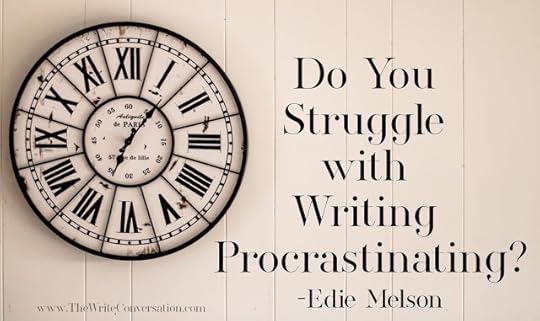
by Edie Melson @EdieMelson
I love writing. And I love talking about writing.
Sitting around with other writers, discussing all things literary is one of my favorite things. It’s one of the reasons I love attending writing conferences.
But there are people we know who like talking about writing so much that’s all they do. They join writers groups, critique groups, even take classes. The one thing they don’t do is write.
Unfortunately, this problem of avoidance can happen to any of us.
Writing is hard work. Avoiding it is often easier than just sitting in the chair and banging out words. There comes a time though, when we have to just quit procrastinating, sit in the chair and write.
Today I’m going to share some things I do when I’m tempted to do anything but write. Set a goal. I play games with my goals. Sometimes I’ll set a time goal—I’m going to write for an hour—no matter what. Sometimes I’ll set a word count goal—I’m not going to get up until I’ve written 1000 words.Set a reward. I try to avoid food related goals, but truthfully, nothing helps the words flow like the promise of chocolate. However, the promise of a new pair of shoes after turning in a big project also works for me!Break it into manageable pieces. Don’t tackle a hard goal all at once. Break it into small manageable bits. This will help you see the progress.Turn on the music. For me, music (instrumental—no words) helps me get in the groove.Change the scenery. When I hit a wall, it helps to go around it—literally. If I’m in my office, I may move to the dining room or even the back porch.Turn off the Internet. Or at least log off your social media. It’s tempting to ask for support or commiseration on Facebook, but it can lead to conversation. And the only words you need are the ones that show up on the page.Schedule a Write-in. Get a friend or two and hold each other accountable. If you can’t meet in person, get together online, through Skype or a Google Hangout.Throw up on the page. NO, not literally. But I’ve found that sometimes I have to write junk before I can get to the good stuff. So go ahead and write crap, get it out of the way and keep going. Chances are there is something useable in it.
Now I’d like to hear from you. What tricks have you found to keep yourself in the chair banging out words?
TWEETABLE
Do You Struggle with Writing Procrastinating? - @EdieMelson (Click to Tweet)
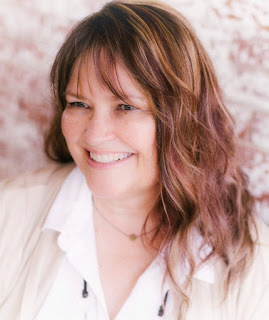 Edie Melson is a woman of faith with ink-stained fingers observing life through the lens of her camera. No matter whether she’s talking to writers, entrepreneurs, or readers, her first advice is always “Find your voice, live your story.” As an author, blogger, and speaker she’s encouraged and challenged audiences across the country and around the world. Her numerous books reflect her passion to help others develop the strength of their God-given gifts and apply them to their lives. Connect with her on her website, through Facebook, Twitter and Instagram.
Edie Melson is a woman of faith with ink-stained fingers observing life through the lens of her camera. No matter whether she’s talking to writers, entrepreneurs, or readers, her first advice is always “Find your voice, live your story.” As an author, blogger, and speaker she’s encouraged and challenged audiences across the country and around the world. Her numerous books reflect her passion to help others develop the strength of their God-given gifts and apply them to their lives. Connect with her on her website, through Facebook, Twitter and Instagram.
Published on March 01, 2020 22:00
February 29, 2020
So That You May Know For Certain

by Audrey Frank @AudreyCFrank
Now many have undertaken to compile an account of the things that have been fulfilled among us, like the accounts passed on to us by those who were eyewitnesses and servants of the word from the beginning. So it seemed good to me as well, because I have followed all things carefully from the beginning, to write an orderly account for you, most excellent Theophilus, so that you may know for certain the things you were taught. Luke 1:1-4, NET
We held our breath as music intro to the local news marched through our living room. Alert and erect, two reporters looked directly into the camera, faces serious, as The Defenders rose in a flash of orange beneath them on the television screen. It was not just any news they were reporting tonight; it was the very personal story of our son’s survival of a fire that ravaged our home months earlier. We were more than a little nervous about how they would report our private pain. We hoped they would adhere to the facts without embellishment.
Many had heard about the fire that broke out as our fifteen-year-old aspiring chef was making a family meal on that fateful evening. Tales were circulating about the way he battled the flames to get our dogs outside and managed to put the fire out before it destroyed our home completely. Thousands were praying as he fought for his life in a burn specialty hospital in another city.
Over the next few minutes, investigative reporters carefully laid out the facts with veracity and compassion, building a case for a burn center in our city. In the end, we breathed a sigh of relief. The reporter who had followed our story from the beginning had faithfully reported the information and given a compassionate, considerate presentation of all that happened to change our lives forever.
Investigative reporters are charged with giving a careful, factual account of events so their audience may know for certain about a given matter. They examine, record, and research. They talk with witnesses. They question and answer. They report their findings, providing their recipients with the best possible data from which to draw a confident and definite conclusion.
Investigative reporters are not new to the modern age.
Luke, the author of the gospel book by his name, was one such writer. He makes his purpose clear in the first four verses of his work: to write an orderly account, …so that you may know for certain the things you were taught.
Luke is said to have traveled with Paul. He walked among people who had witnessed the death and resurrection of Christ, though there is no indication that he himself was an eye-witness. A physician, he was educated and systematic, orderly and precise. Luke gives us one of the clearest reports of the life, miracles, death, and resurrection of Jesus Christ.
His profession informed much of his approach to the gospel report he gave us. Luke uses the Greek word for “autopsy” to describe his investigation with firsthand knowledge of those who had witnessed Jesus’s teaching and miracles in person. Accuracy was of the utmost importance to him.
Luke presented Jesus as a barrier-breaker, breaching the divide between Jews and Gentiles, women and men, rich and poor. The Jesus of Luke is a Savior to all people who come to Him. Luke included more stories about Jesus’ restorative, honoring encounters with women than any other gospel author.
As Christian writers, we have a responsibility to be investigative reporters.
We are witnesses to the grace and power of Jesus in the world today. We can give a faithful account of the Messiah, so that our readers may know for certain that He is the Savior to all who come to Him. Each of us can begin where we are, through the lenses of our own personal gifts and professions.
I am a speech-language pathologist by profession. My work among the poor with cleft lips and palates has informed my investigative reporting of Jesus. I have seen His healing hand in the bodies and hearts of people around the world. I know firsthand how He brings beauty out of ashes. I am compelled to carefully report all I have learned about Him, to share the hope I have found.
What kind of reporter will you be? Together we can bring our diverse gifts to the world, giving a faithful account of the Lord, that our readers may know for certain that Jesus is Savior to all who come to Him.
Lord, make me a writer who helps readers know for certain You are the Savior of the world. Amen.
TWEETABLE
So That You May Know For Certain - @AudreyCFrank on @EdieMelson (Click to Tweet)
 Audrey Frank is an author, speaker, and storyteller. The stories she shares are brave and true. They give voice to those whose words are silenced by shame, the hard things in life that don’t make sense, and the losses that leave us wondering if we will survive. Audrey and her family have spent over twenty years living and working among different cultures and world views, and she has found that God’s story of redemption spans every geography and culture. He is the God of
Instead
, giving honor instead of shame, gladness instead of mourning, hope instead of despair. Although she has three different degrees in communication and intercultural studies, Audrey’s greatest credential is that she is known and loved by the One who made her.
Audrey Frank is an author, speaker, and storyteller. The stories she shares are brave and true. They give voice to those whose words are silenced by shame, the hard things in life that don’t make sense, and the losses that leave us wondering if we will survive. Audrey and her family have spent over twenty years living and working among different cultures and world views, and she has found that God’s story of redemption spans every geography and culture. He is the God of
Instead
, giving honor instead of shame, gladness instead of mourning, hope instead of despair. Although she has three different degrees in communication and intercultural studies, Audrey’s greatest credential is that she is known and loved by the One who made her.Audrey is the author of Covered Glory: The Face of Honor and Shame in the Muslim World (Harvest House Publishers), an outpouring of Audrey’s heart to introduce others to the God of Instead. Shame is not unique to the developing world, the plight of the women behind veils, young girls trafficked across borders; shame is lurking in hearts everywhere. Through powerful stories from women around the world, Covered Glory illuminates the power of the Gospel to remove shame, giving honor instead. Available at favorite booksellers: Barnes & Noble , Books A Million, Amazon.
You can also find Audrey at www.audreyfrank.com, as well as on Twitter and Facebook
Published on February 29, 2020 22:00
February 28, 2020
Remembering What Defines True Success as a Writer
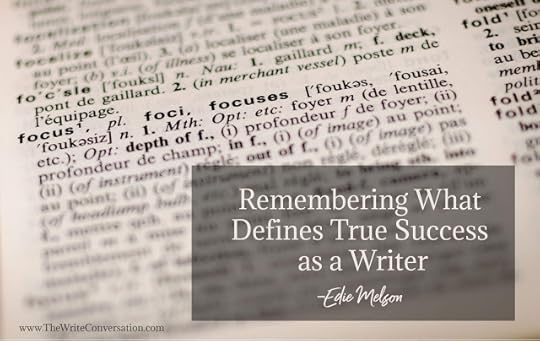
by Edie Melson @EdieMelson
For where your treasure is, there your heart will be also. Matthew 6:21
One thing I’ve noticed is that we writers are way too hard on ourselves. We’re constantly comparing ourselves to each other, looking for affirmation through someone else’s opinion about our work and even our calling.We check to see how many views our articles get, how many followers our blogs have and how many stars the reviewer gave our latest book. These things can undermine and sometimes even totally destroy our perspective, not to mention our confidence. Because, let’s face it, there is always someone willing to point out what we did wrong or could have done better.
If we’re not careful, we can get to the point where we treasure what others are saying about us more than what God is doing through us.
So how do we stay focused in this crazy writing world where everyone seems eager to pass judgment? I think the key to thriving is to keep focused on what and especially on WHO truly matters.
These are somethings I focus on when life seems out of focus. Because when life goes out of focus, it’s almost always a priority issue.
These are the things I look at to make sure my priorities are in line.
1. My prayer focus. Even though I know I need to always begin writing with a time of prayer, that seems to be the first thing I forget when I get stressed. Having a daily quiet/prayer time is part of my life routine, but that’s not enough. I must begin every writing time with prayer.
2. Time in God’s word. If my daily time with God begins to shrink or disappear, then my writing life suffers.
3. Remembering the why. Yes, I’ve always been a writer, but when I answered God’s call to write for Him, my foundation changed. When I find myself chasing numbers, I go back to number 1. I refocus on my calling and more importantly the one who called me.
4. I refocus on relationships, instead of connections. There is a difference in these two. Relationships are built, connections are just numbers. Connections—when nurtured—often grow into relationships, but only when we concentrate on serving people instead of amassing numbers.5. I rehearse what God has already done. No matter where you are on your writing journey, you have already seen God at work. Make note of the good things along the way—the whispers from God you’ve heard in your soul, the honest words of encouragement others have spoken or written to you, the successes you’ve had. We place far too much focus on the things we’ve done wrong, instead of the amazing things God is doing through us.
Bottom LineI’ve found that when I treasure God’s word and His opinion, my heart stays safe and protected. I’m insulated from a worldly perspective determined to destroy anything God has called good.
TWEETABLERemembering What Defines True Success as a Writer - @EdieMelson (Click to Tweet)
 Edie Melson is a woman of faith with ink-stained fingers observing life through the lens of her camera. No matter whether she’s talking to writers, entrepreneurs, or readers, her first advice is always “Find your voice, live your story.” As an author, blogger, and speaker she’s encouraged and challenged audiences across the country and around the world. Her numerous books reflect her passion to help others develop the strength of their God-given gifts and apply them to their lives. Connect with her on her website, through Facebook, Twitter and Instagram.
Edie Melson is a woman of faith with ink-stained fingers observing life through the lens of her camera. No matter whether she’s talking to writers, entrepreneurs, or readers, her first advice is always “Find your voice, live your story.” As an author, blogger, and speaker she’s encouraged and challenged audiences across the country and around the world. Her numerous books reflect her passion to help others develop the strength of their God-given gifts and apply them to their lives. Connect with her on her website, through Facebook, Twitter and Instagram.
Published on February 28, 2020 22:00



